Related Research Articles

The Essanay Film Manufacturing Company was an early American motion picture studio. The studio was founded in 1907 and based in Chicago, and later developed an additional film lot in Niles Canyon, California. Its stars included Francis X. Bushman, Gloria Swanson and studio co-owner, actor and director, Broncho Billy Anderson. It is probably best known today for its series of Charlie Chaplin comedies. In the late 1910's it merged with other studios and stopped releasing films in 1918. According to film historian Steve Massa, Essanay is one of the important early studios, with comedies as a particular strength.

Bernard "Ben" Turpin was an American comedian and actor, best remembered for his work in silent films. His trademarks were his cross-eyed appearance and adeptness at vigorous physical comedy. Turpin worked with notable performers such as Charlie Chaplin and Laurel and Hardy, and was a part of the Mack Sennett studio team. He is believed to have been the first filmed "victim" of the pie in the face gag. When sound came to films, Turpin chose to retire, having invested profitably in real estate, although he did do occasional cameos.

Olga Edna Purviance was an American actress of the silent film era. She was the leading lady in many of Charlie Chaplin's early films and in a span of eight years, she appeared in over 30 films with him.
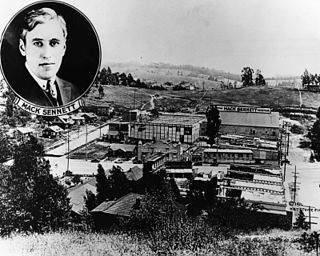
Keystone Studios was an early film studio founded in Edendale, California on July 4, 1912 as the Keystone Pictures Studio by Mack Sennett with backing from actor-writer Adam Kessel (1866–1946) and Charles O. Baumann (1874–1931), owners of the New York Motion Picture Company. The company, referred to at its office as The Keystone Film Company, filmed in and around Glendale and Silver Lake, Los Angeles for several years, and its films were distributed by the Mutual Film Corporation between 1912 and 1915. The Keystone film brand declined rapidly after Sennett went independent in 1917.
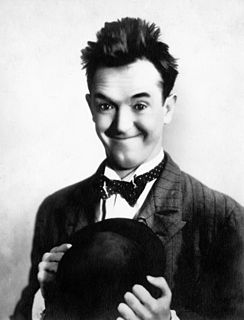
Stan Laurel was an English comic actor, writer, and film director who was part of the comedy duo Laurel and Hardy. He appeared with his comedy partner Oliver Hardy in 107 short films, feature films, and cameo roles.
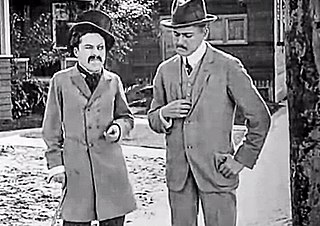
Making a Living is the first film starring Charlie Chaplin. A one-reel comedy short, it was completed in three days at Keystone Studios in Los Angeles, California and was released for distribution on February 2, 1914. In it Chaplin portrays a charming swindler who runs afoul of a news reporter and a Keystone Cop. In addition to co-writing the "scenario" and directing the production, Henry Lehrman performs as the principal supporting character.

Twenty Minutes of Love is a 1914 American comedy silent film made by Keystone Studios. The film is widely reported as Charlie Chaplin's directorial debut; some sources name Joseph Maddern as the director, but generally credit Chaplin as the creative force.

Svengoolie is an American hosted horror movie television program. The show features horror and science fiction films and is hosted by the eponymous character Svengoolie, who was originally played by Jerry G. Bishop from 1970 to 1973, before Rich Koz succeeded him in the role from 1979 on. Before and after commercial breaks, Svengoolie presents sketches, tells jokes, and performs parody songs related to the films being aired. The show is a long-running local program in the Chicago area and in recent years expanded nationally, airing Saturday nights on MeTV.

The Gorilla is a 1939 American horror comedy film starring the Ritz Brothers, Anita Louise, Art Miles, Lionel Atwill, Bela Lugosi, and Patsy Kelly. It was based on the 1925 play of the same name by Ralph Spence.

A Burlesque on Carmen is Charlie Chaplin's thirteenth film for Essanay Studios, originally released as Carmen on December 18, 1915. Chaplin played the leading man and Edna Purviance played Carmen. The film is a parody of Cecil B. DeMille's Carmen 1915, which was itself an interpretation of the popular novella Carmen by Prosper Mérimée.
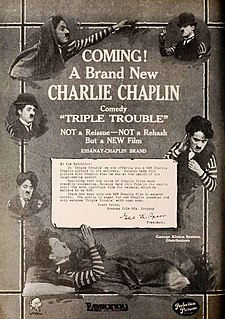
Triple Trouble is a two-reel American silent comedy film that was released in 1918. It stars Charlie Chaplin, Edna Purviance, and Leo White. This film was not an official Chaplin film, even though it has many Chaplin-directed scenes; after he left the studio,Essanay edited it together using outtakes and newly shot footage directed by Leo White. It had already been established in court that Chaplin had no legal control over the films made during his time with Essanay and could not prevent its release.

Duck Soup is a silent comedy short film starring Stan Laurel and Oliver Hardy prior to their official billing as the duo Laurel and Hardy. The team appeared in a total of 107 films between 1921 and 1951.

Flying Elephants is a two-reel silent film from 1928 directed by Frank Butler and produced by Hal Roach. It stars Stan Laurel and Oliver Hardy as a pair of battling cavemen.

Habeas Corpus is a silent short subject co-directed by Leo McCarey and James Parrott starring comedy duo Laurel and Hardy. It was released by Metro-Goldwyn-Mayer on December 1, 1928
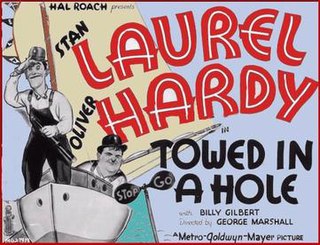
Towed in a Hole is a 1932 pre-Code comedy film starring Laurel and Hardy. The "two-reeler" short was produced by Hal Roach, directed by George Marshall, and distributed by Metro-Goldwyn-Mayer.

Jules White was a Hungarian-American film director and producer best known for his short-subject comedies starring The Three Stooges.
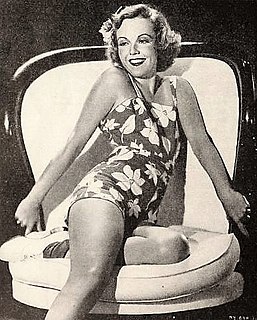
Dorothy Lee was an American actress and comedian during the 1930s. She appeared in 28 films, usually appearing alongside the Wheeler & Woolsey comedy team.
Olives and Their Oil is a 1914 educational short film about the production of olive oil. The film was released by Keystone Studios on February 7, 1914, on a split reel with the Charlie Chaplin comedy Kid Auto Races at Venice.

Clarine E. Seymour was an American silent film actress.

Invisible Invaders is a 1959 science fiction film starring John Agar, Jean Byron, John Carradine and Philip Tonge. It was produced by Robert E. Kent, directed by Edward L. Cahn and written by Samuel Newman.
References
- ↑ Dick, Bernard F. (1993). The Merchant Prince of Poverty Row: Harry Cohn of Columbia Pictures. University Press of Kentucky. p. 206. ISBN 0-8131-1841-7.
- ↑ Brotherton, Jamie (2013). Dorothy Lee: The Life and Films of the Wheeler and Woolsey Girl. McFarland & Company. p. 196. ISBN 1476600481.
- ↑ Neibaur, James L. (2012). Stan Without Ollie: The Stan Laurel Solo Films, 1917-1927. McFarland & Company. p. 248. ISBN 0786489871.
- ↑ Yurkiw, Mark (2016) [2007]. Chicago TV Horror Movie Shows: From Shock Theatre to Svengoolie. Southern Illinois University Press. p. 270. ISBN 0809335387.
- ↑ Maska, David (2005). Charlie Chaplin at Keystone and Essanay: Dawn of the Tramp. iUniverse. p. 230. ISBN 0595365981.
- ↑ Mulqueen, Jack (2016) [2004]. The Golden Age of Chicago Children's Television. Southern Illinois University Press. p. 274. ISBN 0809335360.
- ↑ Neibaur. James L. (2013). The Jerry Lewis Films: An Analytical Filmography of the Innovative Comic. McFarland & Company. p. 295. ISBN 0786475005.
- ↑ Svehla, Gary J.; Svehla, Susan (eds.). Guilty Pleasures of the Horror Film. p. 320. ISBN 1887664033.
- ↑ MacGillivray, Scott (2004). Castle Films: A Hobbyist's Guide. iUniverse. p. 434. ISBN 0595324916.